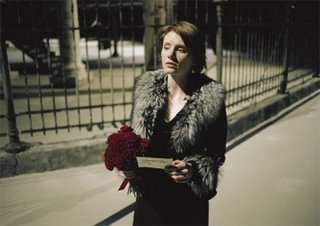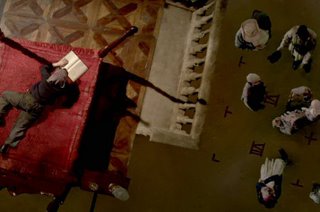Happiness in Slavery
 I missed Manderlay during its initial theatrical run. Relegated like a leper to a quite distant and conservative section of Los Angeles and limited to a single screening time of 11:00 am, it would seem that the film was on self-imposed exile. My concern was simple: was this indicative of the quality or the content of the film? American film critics ravaged Manderlay, but then Dogville, which I consider to be quite an exceptional film, was met with a similarly frigid reception. I suppose that's what happens when you make a trilogy criticizing America and then expect an impartial reception. A good critic should separate themselves from their national fervency, but a little bit of pride can be a deadly thing.
I missed Manderlay during its initial theatrical run. Relegated like a leper to a quite distant and conservative section of Los Angeles and limited to a single screening time of 11:00 am, it would seem that the film was on self-imposed exile. My concern was simple: was this indicative of the quality or the content of the film? American film critics ravaged Manderlay, but then Dogville, which I consider to be quite an exceptional film, was met with a similarly frigid reception. I suppose that's what happens when you make a trilogy criticizing America and then expect an impartial reception. A good critic should separate themselves from their national fervency, but a little bit of pride can be a deadly thing.
As it turns out, Manderlay's exile was indicative of both its quality and its content. Following Grace's flight from the township of Dogville at her father's side, the gangster caravan makes a momentary pit stop at the township of Manderlay where Grace discovers a plantation which has ignored the abolition of slavery for more than 70 years. Disastrously lacking in its predecessor's cinematically familiar, Noir-ish narrative drive, the first half of Manderlay is a jumbled dirge of establishing sequences drained of any sort of causality. The flow is lethargic at best and all the obviousness of the plot points promise a lengthy and punishing viewing experience.
 But then, about halfway through, the film kicks in, and though I'm not convinced that it makes up for the beginning, Von Trier allows the theoretical investigations which slightly flavored the opening half to dominate the narrative. Grace's teachings of democracy come back to haunt her in frighteningly mortal ways. Her politically correct tendencies are hillariously frustrated by her uncouth sexual longings. This is, in fact, where the film finally takes off. As Grace walks about the yard, deep in thought, she finds herself at the bath house. Nude, black men shower and exhibit their sensualized bodies. Grace finds herself caught between her teachings and her longing. And eventually she forfeits principals for the more carnal lessons of life.
But then, about halfway through, the film kicks in, and though I'm not convinced that it makes up for the beginning, Von Trier allows the theoretical investigations which slightly flavored the opening half to dominate the narrative. Grace's teachings of democracy come back to haunt her in frighteningly mortal ways. Her politically correct tendencies are hillariously frustrated by her uncouth sexual longings. This is, in fact, where the film finally takes off. As Grace walks about the yard, deep in thought, she finds herself at the bath house. Nude, black men shower and exhibit their sensualized bodies. Grace finds herself caught between her teachings and her longing. And eventually she forfeits principals for the more carnal lessons of life.
Von Trier, increasingly short on subtlety, makes his thoughts completely evident without ever truly stating his claims. Grace never says, "Fuck me you black stud," and yet her face says little else when her eyes fall upon Timothy, a "proudy nigger." In the end, the film's strength lies in the inevitable defeat of all of the liberal intentions Grace strives for. It's a beautiful slap in the face of all things which considered themselves "liberal," exposing the hypocritical piety of those who pause and say, in a slightly hushed voice, "african american" when they were about to say black. And near the film's close, when Grace reads aloud from "Man's Law," the document which has kept all of the slaves of Manderlay subjugated these many years, we are treated to a painfully familiar sounding treaty. It's a wonderful moment - one which caused me to applaud with surprise. I suppose my resonse could be interpreted as a symptom of waiting, but then that's what Von Trier's cinema is all about.

1 Comments:
You pointed out exactly where Manderlay becomes an interesting film and separates itself from being simply Dogville 2. What did you think of Bryce Dallas Howard?
Post a Comment
<< Home